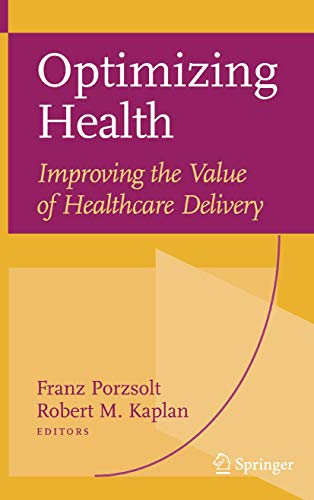optimizing health improving value (17 resultados)
Filtros de búsqueda
Tipo de artículo
- Todos los tipos de productos
- Libros (17)
- Revistas y publicaciones (No hay ningún otro resultado que coincida con este filtro.)
- Cómics (No hay ningún otro resultado que coincida con este filtro.)
- Partituras (No hay ningún otro resultado que coincida con este filtro.)
- Arte, grabados y pósters (No hay ningún otro resultado que coincida con este filtro.)
- Fotografías (No hay ningún otro resultado que coincida con este filtro.)
- Mapas (No hay ningún otro resultado que coincida con este filtro.)
- Manuscritos y coleccionismo de papel (No hay ningún otro resultado que coincida con este filtro.)
Condición Más información
- Nuevo (14)
- Como nuevo, Excelente o Muy bueno (1)
- Bueno o Aceptable (2)
- Regular o Pobre (No hay ningún otro resultado que coincida con este filtro.)
- Tal como se indica (No hay ningún otro resultado que coincida con este filtro.)
Encuadernación
Más atributos
- Primera edición (2)
- Firmado (No hay ningún otro resultado que coincida con este filtro.)
- Sobrecubierta (No hay ningún otro resultado que coincida con este filtro.)
- Con imágenes (8)
- No impresión bajo demanda (11)
Idioma (1)
Precio
- Cualquier precio
- Menos de EUR 20 (No hay ningún otro resultado que coincida con este filtro.)
- EUR 20 a EUR 45
- Más de EUR 45
Gastos de envío gratis
- Envío gratis a Estados Unidos de America (No hay ningún otro resultado que coincida con este filtro.)
Ubicación del vendedor
Valoración de los vendedores
-
Optimizing Health : Improving the Value of Healthcare Delivery
Librería: Better World Books Ltd, Dunfermline, Reino Unido
Original o primera edición
EUR 33,28
EUR 9,17 shipping
Se envía de Reino Unido a Estados Unidos de AmericaCantidad disponible: 1 disponibles
Añadir al carritoCondición: Good. 1st Edition. Ships from the UK. Former library book; may include library markings. Used book that is in clean, average condition without any missing pages.
-
Optimizing Health : Improving the Value of Healthcare Delivery
Librería: Better World Books Ltd, Dunfermline, Reino Unido
Original o primera edición
EUR 33,28
EUR 9,17 shipping
Se envía de Reino Unido a Estados Unidos de AmericaCantidad disponible: 1 disponibles
Añadir al carritoCondición: Good. 1st Edition. Ships from the UK. Used book that is in clean, average condition without any missing pages.
-
Optimizing Health: Improving the Value of Healthcare Delivery
Librería: Lucky's Textbooks, Dallas, TX, Estados Unidos de America
EUR 52,20
EUR 3,40 shipping
Se envía dentro de Estados Unidos de AmericaCantidad disponible: Más de 20 disponibles
Añadir al carritoCondición: New.
-
Optimizing Health: Improving the Value of Healthcare Delivery
Librería: Lucky's Textbooks, Dallas, TX, Estados Unidos de America
EUR 52,60
EUR 3,40 shipping
Se envía dentro de Estados Unidos de AmericaCantidad disponible: Más de 20 disponibles
Añadir al carritoCondición: New.
-
Optimizing Health: Improving the Value of Healthcare Delivery
Librería: Ria Christie Collections, Uxbridge, Reino Unido
EUR 58,23
EUR 13,74 shipping
Se envía de Reino Unido a Estados Unidos de AmericaCantidad disponible: Más de 20 disponibles
Añadir al carritoCondición: New. In.
-
Optimizing Health: Improving the Value of Healthcare Delivery
Idioma: Inglés
Publicado por Springer US, Springer New York Sep 2006, 2006
ISBN 10: 0387339205 ISBN 13: 9780387339207
Librería: buchversandmimpf2000, Emtmannsberg, BAYE, Alemania
EUR 53,49
EUR 60,00 shipping
Se envía de Alemania a Estados Unidos de AmericaCantidad disponible: 2 disponibles
Añadir al carritoBuch. Condición: Neu. Neuware -As health care costs soar there is increasing interest in examining what society and, particularly, patients receive in return for these expenditures. Optimizing Health brings together the best thinking from both sides of the Atlantic to explore these issues. It employs disciplinary perspectives from economics, ethics, philosophy, psychology, clinical practice, and epidemiology to explore various ways that value for patients have and can be determined. It concludes with a discussion of changes required in practice, research, and health care systems to maximize the outcomes received from the provision of medical care services from the patient¿s perspective.The first section of the book provides theoretical perspectives from economics and systems thinking that help us to focus on how one might determine the value of medical care for patients. The next section considers the ethical and philosophical dilemmas that face developed countries in distributing medical care. How is justice served and evidence-based medicine employed to increase the value of medical care for patients The section on psychology deals with measuring outcomes from the patient¿s perspective and involving patients in medical decision making. Measuring quality of life and gaining valid quality of life information when patients cannot respond for themselves are important topics covered by these chapters. Other chapters consider ways that patients can become more involved in medical decision making with the expectation that this will increase the value of medical care for patients.A major section of the book about clinical practice discusses problems that can reduce the value to patients of medical care. These include overdiagnosis, aggressive treatments that do not result in better patient outcomes, findings that earlier diagnosis does not always result in better outcomes, and the extent of medical error in treatment.The final sections deal withcost-effectiveness analyses and applications of clinical epidemiology. The chapters include a number of original investigations and applications of new methodologies. All-in-all, the volume is must reading for practitioners, policy makers, and researchers who want to find in one place the state-of-the-art thinking and future directions of valuing medical care from the patient¿s perspective.Springer Verlag GmbH, Tiergartenstr. 17, 69121 Heidelberg 336 pp. Englisch.
-
Optimizing Health: Improving the Value of Healthcare Delivery
Librería: Ria Christie Collections, Uxbridge, Reino Unido
EUR 103,70
EUR 13,74 shipping
Se envía de Reino Unido a Estados Unidos de AmericaCantidad disponible: Más de 20 disponibles
Añadir al carritoCondición: New. In.
-
Optimizing Health: Improving the Value of Healthcare Delivery
Librería: Chiron Media, Wallingford, Reino Unido
EUR 103,99
EUR 17,76 shipping
Se envía de Reino Unido a Estados Unidos de AmericaCantidad disponible: 10 disponibles
Añadir al carritoPF. Condición: New.
-
Optimizing Health: Improving the Value of Healthcare Delivery
Idioma: Inglés
Publicado por Springer US, Springer US, 2010
ISBN 10: 1441941576 ISBN 13: 9781441941572
Librería: AHA-BUCH GmbH, Einbeck, Alemania
EUR 58,55
EUR 62,44 shipping
Se envía de Alemania a Estados Unidos de AmericaCantidad disponible: 1 disponibles
Añadir al carritoTaschenbuch. Condición: Neu. Druck auf Anfrage Neuware - Printed after ordering - As health care costs soar there is increasing interest in examining what society and, particularly, patients receive in return for these expenditures. Optimizing Health brings together the best thinking from both sides of the Atlantic to explore these issues. It employs disciplinary perspectives from economics, ethics, philosophy, psychology, clinical practice, and epidemiology to explore various ways that value for patients have and can be determined. It concludes with a discussion of changes required in practice, research, and health care systems to maximize the outcomes received from the provision of medical care services from the patient's perspective.The first section of the book provides theoretical perspectives from economics and systems thinking that help us to focus on how one might determine the value of medical care for patients. The next section considers the ethical and philosophical dilemmas that face developed countries in distributing medical care. How is justice served and evidence-based medicine employed to increase the value of medical care for patients The section on psychology deals with measuring outcomes from the patient's perspective and involving patients in medical decision making. Measuring quality of life and gaining valid quality of life information when patients cannot respond for themselves are important topics covered by these chapters. Other chapters consider ways that patients can become more involved in medical decision making with the expectation that this will increase the value of medical care for patients.A major section of the book about clinical practice discusses problems that can reduce the value to patients of medical care. These include overdiagnosis, aggressive treatments that do not result in better patient outcomes, findings that earlier diagnosis does not always result in better outcomes, and the extent of medical error in treatment.The final sections deal withcost-effectiveness analyses and applications of clinical epidemiology. The chapters include a number of original investigations and applications of new methodologies. All-in-all, the volume is must reading for practitioners, policy makers, and researchers who want to find in one place the state-of-the-art thinking and future directions of valuing medical care from the patient's perspective.
-
Optimizing Health: Improving the Value of Healthcare Delivery
Idioma: Inglés
Publicado por Springer US, Springer New York, 2006
ISBN 10: 0387339205 ISBN 13: 9780387339207
Librería: AHA-BUCH GmbH, Einbeck, Alemania
EUR 58,55
EUR 63,34 shipping
Se envía de Alemania a Estados Unidos de AmericaCantidad disponible: 1 disponibles
Añadir al carritoBuch. Condición: Neu. Druck auf Anfrage Neuware - Printed after ordering - As health care costs soar there is increasing interest in examining what society and, particularly, patients receive in return for these expenditures. Optimizing Health brings together the best thinking from both sides of the Atlantic to explore these issues. It employs disciplinary perspectives from economics, ethics, philosophy, psychology, clinical practice, and epidemiology to explore various ways that value for patients have and can be determined. It concludes with a discussion of changes required in practice, research, and health care systems to maximize the outcomes received from the provision of medical care services from the patient's perspective.The first section of the book provides theoretical perspectives from economics and systems thinking that help us to focus on how one might determine the value of medical care for patients. The next section considers the ethical and philosophical dilemmas that face developed countries in distributing medical care. How is justice served and evidence-based medicine employed to increase the value of medical care for patients The section on psychology deals with measuring outcomes from the patient's perspective and involving patients in medical decision making. Measuring quality of life and gaining valid quality of life information when patients cannot respond for themselves are important topics covered by these chapters. Other chapters consider ways that patients can become more involved in medical decision making with the expectation that this will increase the value of medical care for patients.A major section of the book about clinical practice discusses problems that can reduce the value to patients of medical care. These include overdiagnosis, aggressive treatments that do not result in better patient outcomes, findings that earlier diagnosis does not always result in better outcomes, and the extent of medical error in treatment.The final sections deal withcost-effectiveness analyses and applications of clinical epidemiology. The chapters include a number of original investigations and applications of new methodologies. All-in-all, the volume is must reading for practitioners, policy makers, and researchers who want to find in one place the state-of-the-art thinking and future directions of valuing medical care from the patient's perspective.
-
Optimizing Health: Improving the Value of Healthcare Delivery
Librería: Mispah books, Redhill, SURRE, Reino Unido
EUR 108,66
EUR 28,67 shipping
Se envía de Reino Unido a Estados Unidos de AmericaCantidad disponible: 1 disponibles
Añadir al carritoPaperback. Condición: Like New. Like New. book.
-
Optimizing Health: Improving the Value of Healthcare Delivery
Librería: BuchWeltWeit Ludwig Meier e.K., Bergisch Gladbach, Alemania
EUR 53,49
EUR 23,00 shipping
Se envía de Alemania a Estados Unidos de AmericaCantidad disponible: 2 disponibles
Añadir al carritoTaschenbuch. Condición: Neu. This item is printed on demand - it takes 3-4 days longer - Neuware -This book brings together the best thinking from both sides of the Atlantic to explore the issues surrounding soaring health care costs. It employs disciplinary perspectives from economics, ethics, philosophy, psychology, clinical practice, and epidemiology to explore various ways that value for patients have and can be determined. A major section of the book discusses problems that can reduce the value to patients of medical care. The volume is must read for practitioners, policy makers, and researchers who want to find in one place the state-of-the-art thinking and future directions of valuing medical care from the patient's perspective. 336 pp. Englisch.
-
Optimizing Health: Improving the Value of Healthcare Delivery
Librería: BuchWeltWeit Ludwig Meier e.K., Bergisch Gladbach, Alemania
EUR 53,49
EUR 23,00 shipping
Se envía de Alemania a Estados Unidos de AmericaCantidad disponible: 2 disponibles
Añadir al carritoBuch. Condición: Neu. This item is printed on demand - it takes 3-4 days longer - Neuware -This book brings together the best thinking from both sides of the Atlantic to explore the issues surrounding soaring health care costs. It employs disciplinary perspectives from economics, ethics, philosophy, psychology, clinical practice, and epidemiology to explore various ways that value for patients have and can be determined. A major section of the book discusses problems that can reduce the value to patients of medical care. The volume is must read for practitioners, policy makers, and researchers who want to find in one place the state-of-the-art thinking and future directions of valuing medical care from the patient's perspective. 344 pp. Englisch.
-
Optimizing Health: Improving the Value of Healthcare Delivery
Idioma: Inglés
Publicado por Springer-Verlag New York Inc., 2006
ISBN 10: 0387339205 ISBN 13: 9780387339207
Librería: THE SAINT BOOKSTORE, Southport, Reino Unido
EUR 67,76
EUR 20,16 shipping
Se envía de Reino Unido a Estados Unidos de AmericaCantidad disponible: Más de 20 disponibles
Añadir al carritoHardback. Condición: New. This item is printed on demand. New copy - Usually dispatched within 5-9 working days.
-
Optimizing Health: Improving the Value of Healthcare Delivery
Idioma: Inglés
Publicado por Springer US, Springer US Okt 2010, 2010
ISBN 10: 1441941576 ISBN 13: 9781441941572
Librería: buchversandmimpf2000, Emtmannsberg, BAYE, Alemania
EUR 53,49
EUR 60,00 shipping
Se envía de Alemania a Estados Unidos de AmericaCantidad disponible: 1 disponibles
Añadir al carritoTaschenbuch. Condición: Neu. This item is printed on demand - Print on Demand Titel. Neuware -As health care costs soar there is increasing interest in examining what society and, particularly, patients receive in return for these expenditures. Optimizing Health brings together the best thinking from both sides of the Atlantic to explore these issues. It employs disciplinary perspectives from economics, ethics, philosophy, psychology, clinical practice, and epidemiology to explore various ways that value for patients have and can be determined. It concludes with a discussion of changes required in practice, research, and health care systems to maximize the outcomes received from the provision of medical care services from the patient¿s perspective.The first section of the book provides theoretical perspectives from economics and systems thinking that help us to focus on how one might determine the value of medical care for patients. The next section considers the ethical and philosophical dilemmas that face developed countries in distributing medical care. How is justice served and evidence-based medicine employed to increase the value of medical care for patients The section on psychology deals with measuring outcomes from the patient¿s perspective and involving patients in medical decision making. Measuring quality of life and gaining valid quality of life information when patients cannot respond for themselves are important topics covered by these chapters. Other chapters consider ways that patients can become more involved in medical decision making with the expectation that this will increase the value of medical care for patients.A major section of the book about clinical practice discusses problems that can reduce the value to patients of medical care. These include overdiagnosis, aggressive treatments that do not result in better patient outcomes, findings that earlier diagnosis does not always result in better outcomes, and the extent of medical error in treatment.The final sections deal withcost-effectiveness analyses and applications of clinical epidemiology. The chapters include a number of original investigations and applications of new methodologies. All-in-all, the volume is must reading for practitioners, policy makers, and researchers who want to find in one place the state-of-the-art thinking and future directions of valuing medical care from the patient¿s perspective.Springer Verlag GmbH, Tiergartenstr. 17, 69121 Heidelberg 336 pp. Englisch.
-
Optimizing Health: Improving the Value of Healthcare Delivery
Librería: preigu, Osnabrück, Alemania
EUR 49,15
EUR 70,00 shipping
Se envía de Alemania a Estados Unidos de AmericaCantidad disponible: 5 disponibles
Añadir al carritoTaschenbuch. Condición: Neu. Optimizing Health: Improving the Value of Healthcare Delivery | Robert M. Kaplan (u. a.) | Taschenbuch | xxii | Englisch | 2010 | Springer US | EAN 9781441941572 | Verantwortliche Person für die EU: Springer Verlag GmbH, Tiergartenstr. 17, 69121 Heidelberg, juergen[dot]hartmann[at]springer[dot]com | Anbieter: preigu Print on Demand.
-
Optimizing Health: Improving the Value of Healthcare Delivery
Librería: preigu, Osnabrück, Alemania
EUR 49,05
EUR 70,00 shipping
Se envía de Alemania a Estados Unidos de AmericaCantidad disponible: 5 disponibles
Añadir al carritoBuch. Condición: Neu. Optimizing Health: Improving the Value of Healthcare Delivery | Robert M. Kaplan (u. a.) | Buch | xxii | Englisch | 2006 | Springer US | EAN 9780387339207 | Verantwortliche Person für die EU: Springer Verlag GmbH, Tiergartenstr. 17, 69121 Heidelberg, juergen[dot]hartmann[at]springer[dot]com | Anbieter: preigu Print on Demand.











